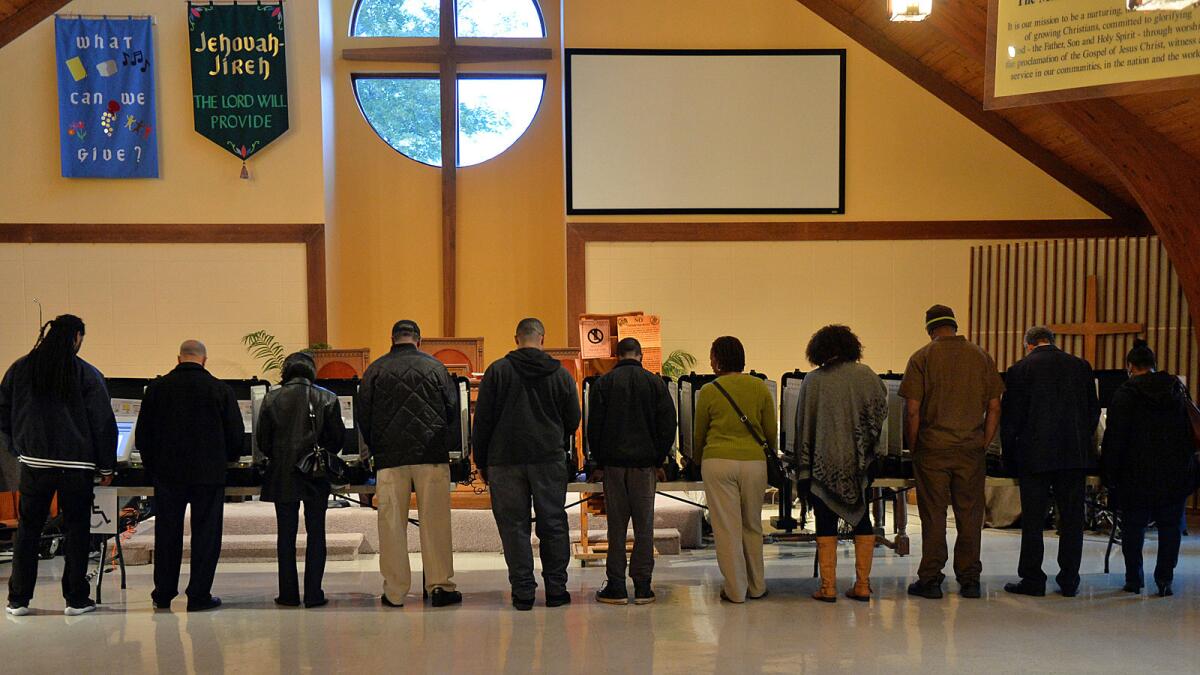We may not know tonight which party officially controls the Senate

Political junkies planning to stay up late on election night to see if Republicans take control of the Senate might want to rethink their plans -- it’s quite possible we won’t know for days or maybe weeks.
If Republicans have a really big night, the results will be obvious early. Two states to keep an eye on would be North Carolina and New Hampshire. Republican victories in both would indicate that Democrats are facing a rout. North Carolina’s polls close at 4:30 p.m. PST, and New Hampshire’s at 5.
More often than not, elections which are close tend to mostly fall in the same direction, and in the closing days of this campaign, that direction has appeared to be toward the GOP.
But that pattern doesn’t always hold. If the tossup races start falling more randomly, and if the contests end up as close as many polls have shown, prepare for a long count for several reasons:
Two states with hot Senate races, Georgia and Louisiana, will go to runoffs if no candidate wins 50%. That’s almost certain to be the case in Louisiana, which has multiple candidates on Tuesday’s ballot.
Georgia’s runoff prospects are less certain, depending on how many votes Amanda Swafford, the Libertarian candidate, draws and how close Michelle Nunn, the Democratic candidate, and David Perdue, the Republican, end up. Most recent polls have indicated a runoff is likely, but not definite.
Louisiana’s runoff will take place Dec. 6. Georgia’s, if needed, wouldn’t happen until Jan. 6, three days after the new Senate is scheduled to be sworn in. Both parties already are preparing for intense battles if Senate control depends on runoff outcomes.
Beyond those two states, several others may not have definitive results available on Tuesday night.
In Iowa, absentee ballots must have been mailed by Monday to be valid, but will be counted if elections officials receive them by Nov. 10, according to a compilation of election deadlines by the National Assn. of Secretaries of State. North Carolina gives mailed-in ballots until the end of this week to arrive. At last count, the state had just short of 27,000 mail-in ballots that had been sent to voters which had not been returned, according to Professor Michael McDonald of the University of Forida, who tracks voter turnout nationwide.
With more and more voters casting their ballots by mail, those delayed ballots could forestall a decision if the races are close enough. Some states give even longer for ballots mailed in by service members overseas.
And then there’s Alaska. The state must collect ballots from far-flung towns and Native American villages, a process that sometimes delays results. Absentee ballots can be received by election officials as late as Nov. 14 as long as they are postmarked by election day.
In 2008, Democratic Sen. Mark Begich had to wait two weeks before being declared the winner, and he might face a similar delay in finding out if he wins reelection. Polls of the state have shown widely varying results, reflecting the difficulty of surveying its widely spread out, small electorate.
Finally, there are the surprises. In 2008, for example, by the time Begich found out he had won, two other states -- Minnesota and Georgia -- still had undecided elections.
The Minnesota contest ultimately went to a recount. It wasn’t resolved until June.
For more on politics and policy, follow @DavidLauter on Twitter.
More to Read
Get the L.A. Times Politics newsletter
Deeply reported insights into legislation, politics and policy from Sacramento, Washington and beyond. In your inbox three times per week.
You may occasionally receive promotional content from the Los Angeles Times.











